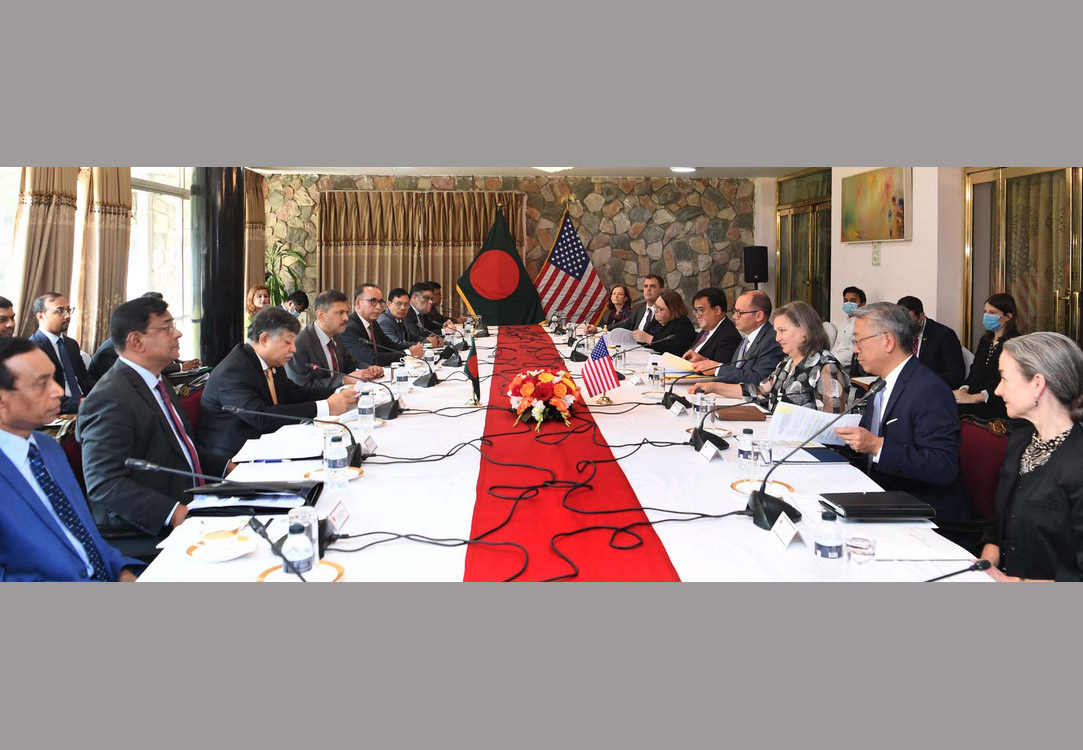
DHAKA, March 20, 2022 (BSS) – The United States (US) today said it noticed “progress” in Rapid Action Battalion (RAB) activities in caring human rights issues in recent months while Dhaka said the Washington-slapped measure against the anti-crime unit in December last might affect Bangladesh efforts to combat terrorism.
“We have seen progress in the last three months with regards remediating these (human rights) things,” said US under Secretary for political affairs Victoria Nuland as Dhaka hosted a crucial bilateral “partnership dialogue”.
Nuland, however, acknowledged Dhaka’s concerns involving the sanction but called it a “complicated and difficult” issue since “our security and counter terrorism cooperation is so important”.
The senior US state department official’s comments came as she emerged from a nearly 90-minute eighth Partnership Dialogue with Bangladesh foreign secretary Masud Bin Momen while both were aided by officials concerned of both the countries at state guest house Padma.
Nuland appreciated Bangladesh declared “zero tolerance” policy over human right violation issues saying she received a paper at the dialogue regarding Dhaka’s plan to address the rights issues.
“US is never going to be silent when we see human right abuses, when we see violation of basic laws, so we talked about it,” she said.
Masud said Dhaka gave a dossier to the US side on the latest development of RAB and its performance and some of the government’s initiatives addressing the “challenges”.
But, he said, Dhaka has raised deep concern about the sanctions during the talks and explained how this might affect “the efforts of Bangladesh government to combat terrorism and transnational crimes”.
“We will continue our discussion (on sanction issue with the US) in several formats, and hopefully this issue will be resolved in due course,” he said, which was echoed by Nuland as well.
Nuland said the dialogue today passed a “draft agreement” on defence cooperation while Bangladesh officials earlier said Washington wanted Dhaka to sign two defence agreements - General Security of Military Information Agreement (GSOMIA) and the Acquisition Cross-Servicing Agreement (ACSA).
“Finally GSOMIA is the gateway to being able to do more on the security front . . . today we passed a draft agreement and we are very confident that we will be able to get the issue settled, so that we can do more on the security side together and that will be looked forward to,” she said.
Asked for comments on the US Indo Pacific Strategy (IPS), Nuland said, it involved economic, security and technology elements and “we love to see Bangladesh be involved in much of it (IPS) as you (Dhaka) are interested in being involved in with”.
Masud said Bangladesh has high expectations from the Biden Administration in terms of building a comprehensive partnership between the two nations.
“We had a frank, elaborate and quite fruitful discussion today on the whole gamut of the bilateral relations between our two countries, encompassing political, economic and security domains,” the foreign secretary said.
He said the both sides also exchanged views on areas of yet untapped potentials like exchange of high-level visits, investment, trade facilitation, connectivity, stronger defence and security cooperation.
Replying to question how US viewed Bangladesh stance on Ukraine crisis, Nuland said today both sides had a “rich conversation” over the issue while the important inflection point was for the battle “between autocracies and democracies” around the world.
She said Bangladesh knew and understood what was happening in Ukraine and this was an “unprovoked brutal attack and violation of sovereignty and territorial integrity” of a democratic country that “Russia has formed efforts”.
“All democracies now need to stand together, and I am confident that we will stand together in speaking the truth about this (Ukraine conflict), and trying to bringing an end to this war and restoring peace and security,” Nuland said.
She added: “we all made to solve it diplomatically rather than going to a war.
Masud called this year’s Partnership Dialogue “specially significant” as the two countries would soon be celebrating the 50th anniversary of their diplomatic ties.
Bangladesh foreign minister Dr AK Abdul Momen was scheduled to hold talks with his US counterpart Antony Blinken in Washington on April 4 to mark the occasion.
Nuland said that the two countries would be involved series of engagements in this year and “we (today’s meeting) are just the appetizer on a very big feast, that we are gonna have this year”.
She said the foreign minister level meeting next month in Washington would be followed by a high level economic dialogue, the security dialogue, a separate defense dialogue and a new US Bangladesh business council.
“We have to take full advantage of as we plan to. . . we have already a very strong deep fifty year old partnership (and) we can do even more together and we will,” she said.
She also mentioned that the US is proud to contribute some 61 million doses of COVID 19 vaccine in Bangladesh, the largest amount anywhere around the globe while Bangladesh inoculated 85 percent of its population, one of the highest records in the world.
Nuland later called on the foreign minister at the foreign ministry.